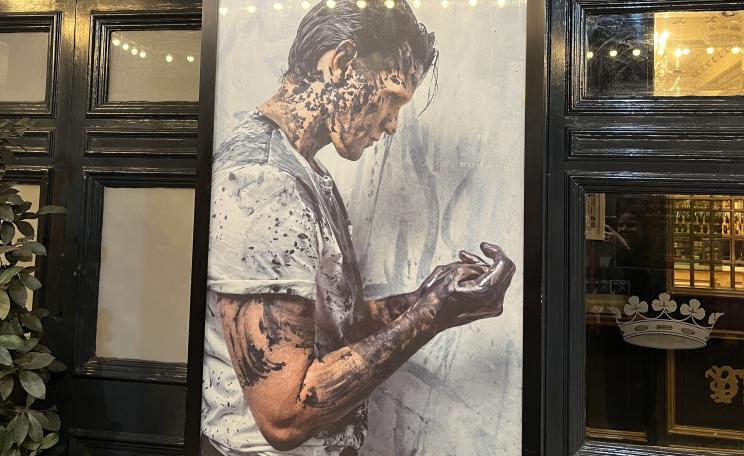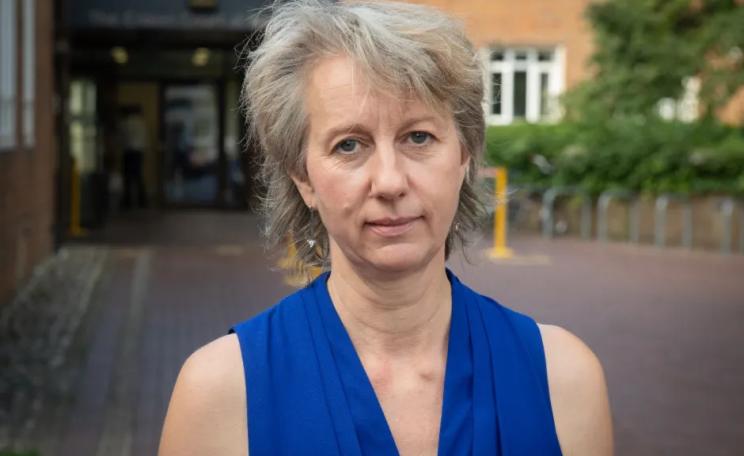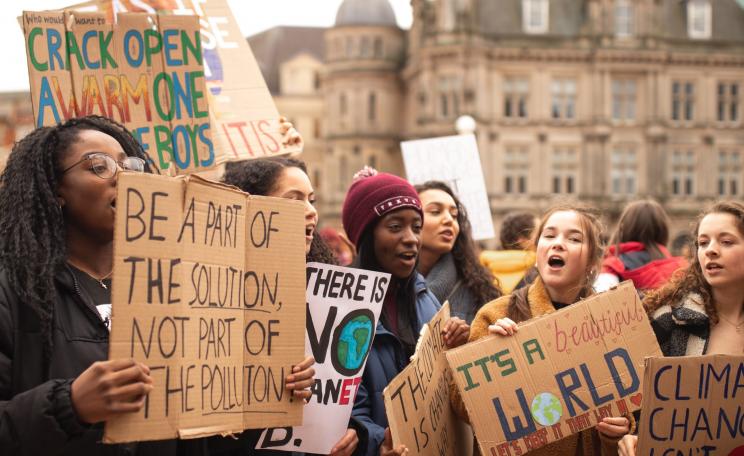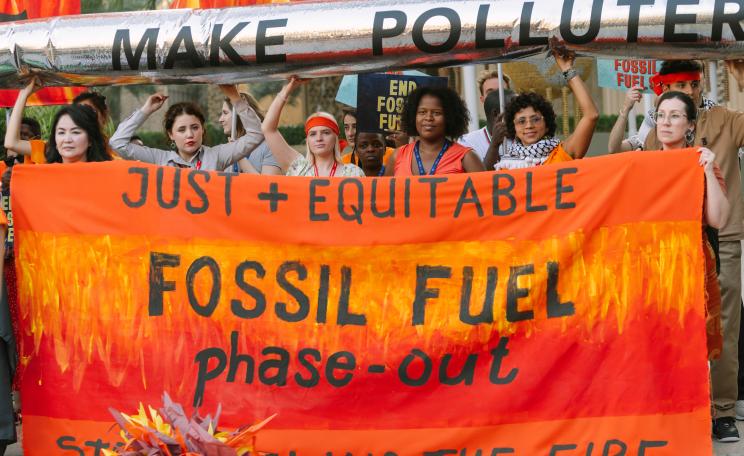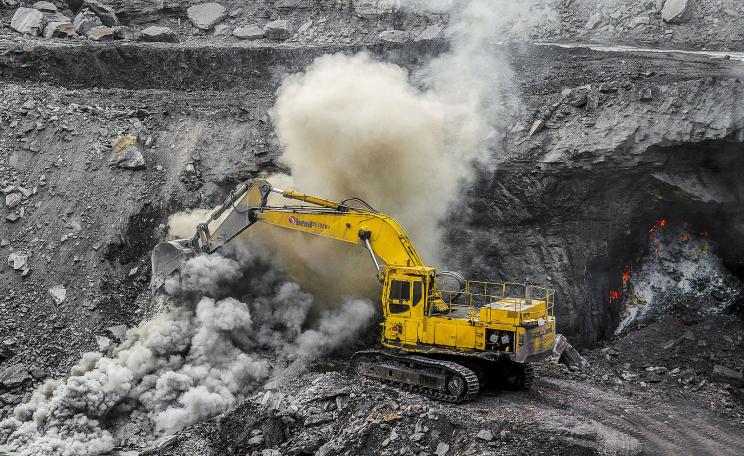The point of a jury is as a safeguard against the state abuse of power. It’s a pretty scary situation – it’s a government that’s totally intolerant of anyone holding it to account.
More than 200 people will stand outside courts around the country today holding signs drawing attention to a jury’s right to decide a case according to its conscience, in a campaign sparked by the treatment of defendants in climate trials.
The action is part of a growing public movement Defend our Juries, sparked by the treatment of Trudi Warner, a 68-year old retired social worker from Walthamstow.
Earlier this year, Warner stood outside the Inner London Crown Court holding a sign stating: “Jurors: you have an absolute right to acquit a defendant according to your conscience.”
Imprisonment
The wording of her sign refers to a principle of common law, the right of a jury to decide a case according to its conscience, and matches that of a historic plaque inside the Old Bailey, which celebrates the courage of the jury that first established the right in 1670.
She made the protest after a judge prevented defendants in a series of climate trials from mentioning climate change or fuel poverty during their trials, leaving jurors in the dark as to their motivations. Many defendants in climate trials have been aqcuitted by juries.
Other members of the public have copied since Warner’s stand outside Inner London Crown Court and other courts.
Last week, solicitor general, Michael Tomlinson KC, announced that he was to charge Warner with contempt of court, an offence which carries a maximum sentence of two years’ imprisonment. Tomlinson is also Conservative MP for Mid Dorset and North Poole.
The decision came as the Metropolitan Police announced that it had launched a criminal investigation into 12 of those who copied her for perverting the course of justice, which has a maximum sentence of life imprisonment. A spokesperson for the police confirmed that it was going ahead with the investigation, but that no arrests had been made.
Coordinated
The nationwide action outside courts had been planned for a few weeks. Tim Crosland, director of Plan B and former barrister, said that the moves by both the government and the Metropolitan Police seemed like “quite a coordinated operation” to deter people from taking part.
“The timing is just too much of a coincidence that both of these things would happen just before the action which we have been quite public about. It feels like there’s a real message there to try and deter people from doing it. But we’ve got a message back, which is actually this isn't going to deter people, because everybody thinks it’s crazy.”
The number of people expected to take part in today’s action has doubled in the past week. The action will take place outside Crown Courts in cities including Birmingham, Bristol, Cambridge, Exeter, London, Manchester, Nottingham, Oxford, and Sheffield.
Several prominent legal figures have spoken out against the decision to prosecute Warner. Human rights barrister Michael Mansfield KC said he was concerned the basic principles of the British jury system were at risk.
The point of a jury is as a safeguard against the state abuse of power. It’s a pretty scary situation – it’s a government that’s totally intolerant of anyone holding it to account.
“The way in which prosecutions are being carried out, and the way in which judges are approaching cases and preventing people from speaking to the jury, and that if you do indicate what your reasons were, the risk is you’re in contempt of court.”
Heavy handed
Retired Cambridge University professor of Law John Spencer said he was “astonished” by the solicitor general’s decision, which he believed was “grotesquely heavy handed”.
“The question is, what exactly is the legal status of the power of the jury to acquit in defiance of the law and a disregard of the judge’s direction of the law on grounds of conscience?
“Is it an unpleasant anomaly in the legal system, which should be minimised in every possible way, and certainly not brought to the jury's attention, in which case you might be a contempt of court to do so. Or is it an important safeguard in the legal system?
“Up till now, the judgments in the leading cases take the view that it's the second of those. If that's the case, it seems extraordinary to see this as contempt of court. And I think it’s grotesquely heavy handed of the solicitor general to be instituting proceedings for contempt,” he said.
In an article in the Barrister magazine: Richard Vogler, professor of Comparative Criminal Law and Criminal Justice at the University of Sussex said: “George Orwell noticed the tendency of repressive law to degenerate into farce, when truth becomes a lie and common sense is heresy."
He added: “I wonder, if displaying other fundamental principles of the common law in the vicinity of a trial court would be considered by Mr. Tomlinson as a criminal offence?
"Would it be an attempt to pervert the course of justice, for example, to express support on a similar sign for the presumption of innocence or the right to a fair trial? And does this mean that such principles no longer apply? or that we are simply not allowed to mention them anywhere near a real trial?”
International condemnation
The UK’s treatment of climate protesters has received international attention.
Earlier this year, the United Nations High Commissioner for Human Rights Volker Türk wrote to the UK government to express concern at the UK’s Public Order Act, which received Royal Assent in May 2023, which it called “deeply troubling legislation” that was “incompatible with the UK’s international human rights obligations regarding people’s rights to freedom of expression, peaceful assembly and association”.
Türk also wrote: “I am also concerned that the law appears to target in particular peaceful actions used by those protesting about human rights and environmental issues. As the world faces the triple planetary crises of climate change, loss of biodiversity and pollution, governments should be protecting and facilitating peaceful protests on such existential topics, not hindering and blocking them.”
Crosland called the overall situation “a trajectory towards authoritarianism.”
He added: “The point of a jury is as a safeguard against the state abuse of power. And we've got international organisations like the UN wondering what is happening in Britain right now. It’s a pretty scary situation – it’s a government that’s totally intolerant of anyone holding it to account.”
This Author
Catherine Early is a freelance environmental journalist and chief reporter for The Ecologist. She tweets at @Cat_Early76.


